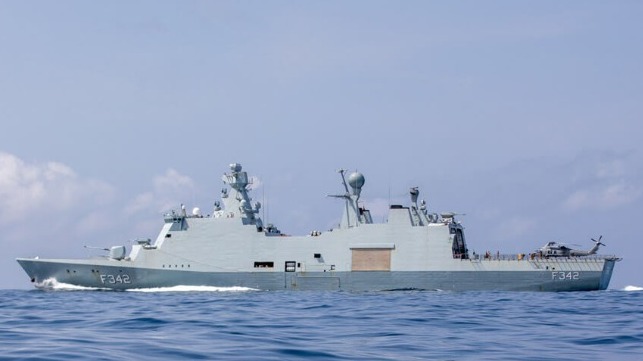Danish Frigate Kills Four Pirates in First Gulf of Guinea Engagement

Less than a month after beginning its patrols in the Gulf of Guinea, the Danish frigate Esbern Snare killed four suspected pirates and took four others into custody. The incident, which is the first involving the newly arrived international presence in the region, is being widely hailed as a potential turning point in the regional fight against piracy.
Forsvaret, Denmark’s defense ministry, reports that on Wednesday, November 24, the Esbern Snare, which had been sailing to Tema, Ghana, responded to reports of increased risk in the area dispatching its helicopter for surveillance. The crew of the helicopter reportedly that afternoon found “a fast-moving motorboat with eight suspicious men on board in an area with a number of merchant ships.” On board the boat, the helicopter crew could see a number of the tools associated with piracy, including ladders.
During the evening, Esbern Snare was close enough to launch a fast-moving boat with its detachment from the frogman corps with orders to board the suspected pirate boat. The ministry reports that the Esbern Snare called the pirates to bring them to a halt so that the Danish soldiers could get on board. When the pirates did not react, the Danish forces fired warning shots and the pirates then opened fire on the Danish soldiers.
A brief firefight ensued with the Danish soldiers acting in self-defense responding to the fire from the pirates. No Danish soldiers were injured, but five pirates were hit before the gun battle ceased. The Danes then boarded the pirate vessel finding that four have been killed, one was wounded, and the remaining three surrendered.
“The incident involving the Danish Navy and the death of four pirates represents a key milestone in the evolution of piracy within the Gulf of Guinea,” writes analysts at security consultants Dryad Global. “In the short-term pirates continuing to target commercial vessels operating within the Gulf of Guinea are unlikely to be significantly deterred from conducting such operations in future as a result of this activity. However, this incident shows the Danish government's intent to have an enforcement impact in the region.”
Danish Prime Minister Mette Frederiksen happened to be visiting the region and had been scheduled to visit the frigate today. Speaking to reporters in Ghana she said that the Danish vessel had likely prevented a pirate attack against a merchant ship highlighting that the vessel and her country were making a significant contribution to regional safety.
The Esbern Snare, which had previously been deployed on security missions in East Africa, departed Denmark at the end of October for a six-month deployment to the Gulf of Guinea. In anticipation of the Prime Minister’s visit Forsvaret, a day earlier described the first steps the vessel was taking working to develop an understanding of ship traffic in the region. The captain explained that they were learning about the level of activity “to establish a picture of what is normal and what is abnormal.” He pointed out that there was likely illegal fishing, as well as vessels that sell fuel to the illegal fishermen, and probably are also a number of smugglers.
"We sit in the ship's operating room and use all the means we have available to collect information and build a normal picture of the area in which we operate. We also obtain all the intelligence we can and thus build a picture of how ships, fishermen, oil platforms, and so on act in the area,” explained Lieutenant Captain Lars Kenneth, who is an operations officer on the Esbern Snare.

that matters most
Get the latest maritime news delivered to your inbox daily.
Forsvaret said that the vessel was working to “clarify where the risk of pirate attacks is greatest, and where the Esbern Snare must therefore position himself to prevent pirate attacks or, if they do occur, be able to intervene as soon as possible.” They are also observing merchant vessels in the area to determine the ones at the highest risk from pirates.
The Danes plan to remain on patrol till April 2022 in the region. At the mid-point of the deployment, they will relieve some members of the crew with replacements from a sister vessel.
